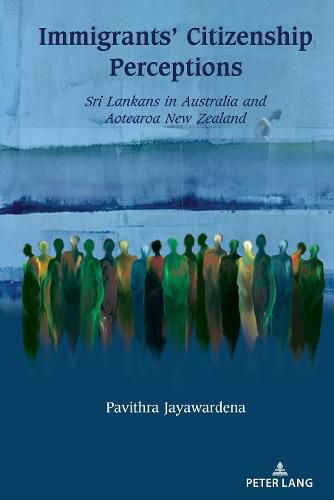Readings Newsletter
Become a Readings Member to make your shopping experience even easier.
Sign in or sign up for free!
You’re not far away from qualifying for FREE standard shipping within Australia
You’ve qualified for FREE standard shipping within Australia
The cart is loading…






This title is printed to order. This book may have been self-published. If so, we cannot guarantee the quality of the content. In the main most books will have gone through the editing process however some may not. We therefore suggest that you be aware of this before ordering this book. If in doubt check either the author or publisher’s details as we are unable to accept any returns unless they are faulty. Please contact us if you have any questions.
Adopting a transnational lens, Immigrants’ Citizenship Perceptions: Sri Lankans in Australia and Aotearoa New Zealand investigates Sri Lankan immigrants’ complex views towards their home (Sri Lankan) and host (Australian or Aotearoa New Zealand) citizenship and the factors that affect them. The book argues that the existing citizenship policies and popular discourses towards immigrants have a strong nation-statist bias in which native citizens believe that they know how exactly immigrants should behave or feel as host citizens. The book problematises this assumption by highlighting the fact that it represents more how immigrants’ citizenship perceptions should be while ignoring how they actually are. Unlike native citizens, immigrants must balance two different positions in how they view citizenship, that is, as native citizens of their home countries and as immigrants in their host countries. These two positionalities lead immigrants to a very different perspective of citizenship. Deliberating on the complexities displayed in Sri Lankan immigrants’ views on their home and host citizenship, the book presents a critical analysis of citizenship views from immigrants’ standpoint. This book will hence be useful for policy makers, students, and researchers in the fields of migration and citizenship as it looks at immigrants’ contextual realities in depth and suggests an alternative approach to understanding their perceptions of citizenship.
$9.00 standard shipping within Australia
FREE standard shipping within Australia for orders over $100.00
Express & International shipping calculated at checkout
This title is printed to order. This book may have been self-published. If so, we cannot guarantee the quality of the content. In the main most books will have gone through the editing process however some may not. We therefore suggest that you be aware of this before ordering this book. If in doubt check either the author or publisher’s details as we are unable to accept any returns unless they are faulty. Please contact us if you have any questions.
Adopting a transnational lens, Immigrants’ Citizenship Perceptions: Sri Lankans in Australia and Aotearoa New Zealand investigates Sri Lankan immigrants’ complex views towards their home (Sri Lankan) and host (Australian or Aotearoa New Zealand) citizenship and the factors that affect them. The book argues that the existing citizenship policies and popular discourses towards immigrants have a strong nation-statist bias in which native citizens believe that they know how exactly immigrants should behave or feel as host citizens. The book problematises this assumption by highlighting the fact that it represents more how immigrants’ citizenship perceptions should be while ignoring how they actually are. Unlike native citizens, immigrants must balance two different positions in how they view citizenship, that is, as native citizens of their home countries and as immigrants in their host countries. These two positionalities lead immigrants to a very different perspective of citizenship. Deliberating on the complexities displayed in Sri Lankan immigrants’ views on their home and host citizenship, the book presents a critical analysis of citizenship views from immigrants’ standpoint. This book will hence be useful for policy makers, students, and researchers in the fields of migration and citizenship as it looks at immigrants’ contextual realities in depth and suggests an alternative approach to understanding their perceptions of citizenship.